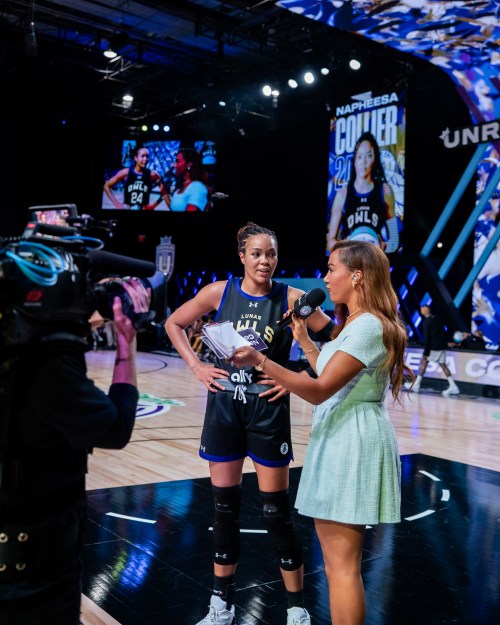Napheesa Collier couldn’t be happier to be in Miami right now doing what she loves. As an all-star forward for the Minnesota Lynx in the Women's National Basketball Association (WNBA) and now co-founder of Unrivaled, the new women’s basketball league she started alongside fellow WNBA player Breanna Stewart, the 28-year-old mother is soaking in the perks: Florida sunshine, playing alongside 35 of the top players in the United States, and getting to stay domestic with her family.
“It's really hard to move your family,” she tells Well+Good, touching on the commonality of WNBA players using the off-season to go overseas to play and make more money. “You're missing holidays, you're in another country. We make most of our money off-court, and when a player’s overseas, their brand essentially goes dark. With the sport exploding right now, it felt like everyone was making money except for the people playing. That’s why Unrivaled is great. It’s happening, and it’s working.”
Don’t just take her word for it, the numbers co-sign it. On A Touch More, WNBA legend Sue Bird highlighted the impressive social media impressions of Unrivaled. “I think the real story, and it’s something we’re seeing in all sports right now, is in social media impressions,” she said after her co-host, wife, and National Women's Soccer League (NWSL) great Megan Rapinoe emphasized the league’s 313,000 TV viewers on opening night back in January. “They had 31 million views on their Bleacher Report Women’s Sports TikTok alone.”
With all the success that Unrivaled has brought, we wanted to catch up with Collier to talk about how she’s feeling about the inaugural season, what her recovery routine looks like, and how she leans into the power of positive self-talk. Here's an inside look at our exclusive interview.
Is Unrivaled everything you hoped for?
More [than what I hoped for], just with the positive reception from both the public and the players. The amount of brands that I've gotten to talk to and open those conversations with and the deals that we're getting players, it’s exactly why we built this.
You have the best players in the world here playing basketball, so the level of competition is also insane. Everyone realizes that we have a vested interest literally in this business, and it is doing so well.
How has staying in the U.S. for the off-season been for your family?
It's been great. It really helps that the weather is so nice. We can go outside whenever we want. We're not stuck inside. Being in one central location has been amazing because the travel is the hardest part. During the season, sometimes I’ll drop my daughter off at school, and she doesn't know if I'm gonna come back in a week or if I'm gonna get her that night. So that's really hard. So, this has definitely been the best situation for our family.
What does recovery look like for you as an athlete?
I'm in the training room a lot, just trying to take care of my body. Every day before practice, after practice, before games, after games. For me, it's cold tubbing, laser treatments, rehab exercises, and whatever I need to get taped. I do what the trainers tell me to do, and I put my body in their hands.
Do you prioritize recovery differently now than you did when you were playing college ball?
It’s actually crazy. I remember coming to college and thinking, ugh—our warmups are so long. Then, by the end of my senior year, I felt like the warm-ups weren’t long enough. So, yes, I definitely feel it a lot more. I’ve adapted my routine. Of course your body's [going to] age, you have to eat differently. I can't eat the same stuff I did in college. If I don’t eat well, I feel it the next day. It’s actually been kind of fun learning my body and what works well for it. I want to play as long as I can. So finding what works best for me is a journey that I enjoy being on.
What nutrition swaps have you made?
In college I would eat anything. I would eat pizza, chicken nuggets, fries,(which I still do), but it was every day, game days, or the day before games. I wasn't conscious at all about what I was eating. I'm sure I would've felt better if I didn't eat that stuff, but I didn't notice it then. Now, I try to get a lot more protein in and obviously cut back on fried food a lot more. Then, the day before games, I'm really cognizant of getting my carbs in and getting a protein shake or something after I'm lifting. I'm more aware of what fuels my body than just taking anything.
How did you adjust to playing at this level again after your pregnancy?
After my pregnancy, rehab was the most challenging thing I’ve gone through. Since then, I'm really staying on top of that. For example, I have to really focus on my glutes and my quads so that my knees stay good. I'm doing exercises every day, including calf exercises so that my heels feel good. There are specific things that I have to do where *knock on wood* there's not been a season-ending injury.
What does your sleep schedule look like, and how does it make you feel?
My toddler's not the best sleeper, so it's not great. I probably get about six and a half hours a night. I feel like I've adapted to it now. At first, it was hard. If I could change one thing, it would be my sleep, but it's not realistic for our life. She’s not a great sleeper—waking up a lot and early. I think I've just adjusted to that, so I feel normal.
How have you been taking care of your mental health?
For me, I really have to step away from the sport. It consumes so much of my life. I'm here for hours; it's my job. So when I'm not at the gym, I really disconnect. I don't watch a lot of basketball, just our games—both the WNBA and Unrivaled. I'm not watching NBA games or seeking out college games much. I spend time with my family, read, and watch movies. That really fills up my cup and refuels me for the next day.
What advice do you have for someone who might be experiencing negative self-talk?
Recognizing it is the first thing. If I recognize that I'm in a pattern of talking badly to myself, I actively try to change it. Especially with the trigger words, like a negative thing you did, instead of "Why would you do that," it's "Okay, why did I do that? What can I do better next time?" Changing specific words for me is helpful, and trying to spin it into a positive way. It's definitely challenging. Basketball is such a results-based profession, but you do feel so much better when you can flip that script and have some grace for yourself.
What do you see when you look in the mirror?
I see what everyone sees, a person. Basketball doesn't define me; I have so many other parts of myself. When you look in the mirror, you see your faults first. It doesn't matter who you are or how many followers you have, there's no correlation to how you see yourself. It's a work in progress like everyone. I'm trying to be more positive, be the best version of myself for my teammates, family, and daughter in every area. Something I'm working on is trying to have grace with myself while still trying to get better.
You can catch more of Napheesa Collier on the court. Unrivaled airs on TNT and TruTV, and is also available to stream on Max. For the full schedule, click here.
Sign Up for Our Daily Newsletter
Get all the latest in wellness, trends, food, fitness, beauty, and more delivered right to your inbox.
Got it, you've been added to our email list.










